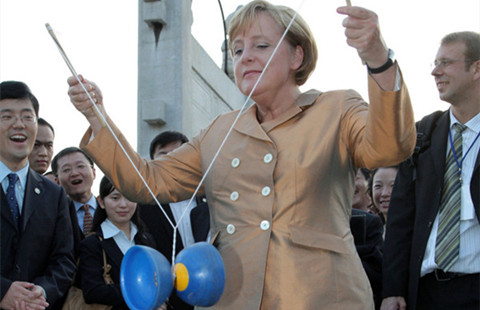Youth and innovation at forefront in German president's China visit
By Zhang Lu and Zhou Wa ( chinadaily.com.cn ) Updated: 2016-03-30 18:53:23With bodies such as the Goethe-Institut in China and the Confucius Institute in Germany, the two countries have achieved progress in cultural and educational collaboration. The number of Chinese learning German has reached 110,000, and more than 30,000 Germans are learning Chinese.
There are about 550 partnerships between Chinese and German universities and colleges. Chinese students are the largest single group of international students in Germany, with about 32,000 Chinese students studying in the country. More than 8,000 German students are studying in China.
Among Chinese universities that have partnerships with German institutions is Tongji University in Shanghai, which Gauck visited. At the university he visited the largest German library in China, which had opened two months earlier.
He also visited the Jewish refugee museum. During the World War II nearly 20,000 Jews who fled Europe found refuge in Shanghai.
Gauck said that his five-day visit, during which he also visited the city of Xi'an in Shaanxi province, had added to what he knew of China.
Alignment of projects
The visit was the first by a German president since 2010 and was in line with the increasing frequency of high-level political exchanges between the two countries, experts said.
In a meeting with Gauck, Chinese premier Li Keqiang spoke of China's willingness to deepen trade and investment with Germany, and he called on the two sides to further align the projects "Made in China 2025" and "German Industry 4.0" and build partnerships with markets in third-party countries.
Li also said German companies were welcome to expand investment in China.
Ma Canrong, a former Chinese ambassador to Germany, said: "While continuing to work together in traditional areas such as trade and manufacturing, China and Germany are also exploring new fields for collaboration, such as on the Belt and Road Initiative and the Asian Infrastructure Investment Bank."
The initiative includes the Silk Road Economic Belt and the 21st Century Maritime Silk Road. It was proposed by President Xi in 2013 and aims to boost trade and connectivity along the ancient trade routes spanning Asia, Europe and Africa.
"These initiatives bring new opportunities for Sino-German cooperation," Ma said, adding that the two countries can work together on building infrastructure in Eastern European countries.
Li Lezeng, an expert on German studies at Tong Ji University, said that amid a global economic slowdown, China and Germany have both emphasized technical innovation and green development.
"China can learn from Germany's expertise in policymaking and technical innovation concerning environmental protection while developing the economy," he said.
Sino-German relations have deepened recently, with 110 joint projects now being implemented, Chinese Foreign Ministry said.
|
|
|
|
|
|
|
|
Features
 Merkel's lighthearted moments in China
Merkel's lighthearted moments in China  British pub becomes tourist attraction after Xi's visit
British pub becomes tourist attraction after Xi's visit
European Weekly
 We will not give up search, Li vows
We will not give up search, Li vows
International hunt for missing airliner continues after fruitless six-day search




















